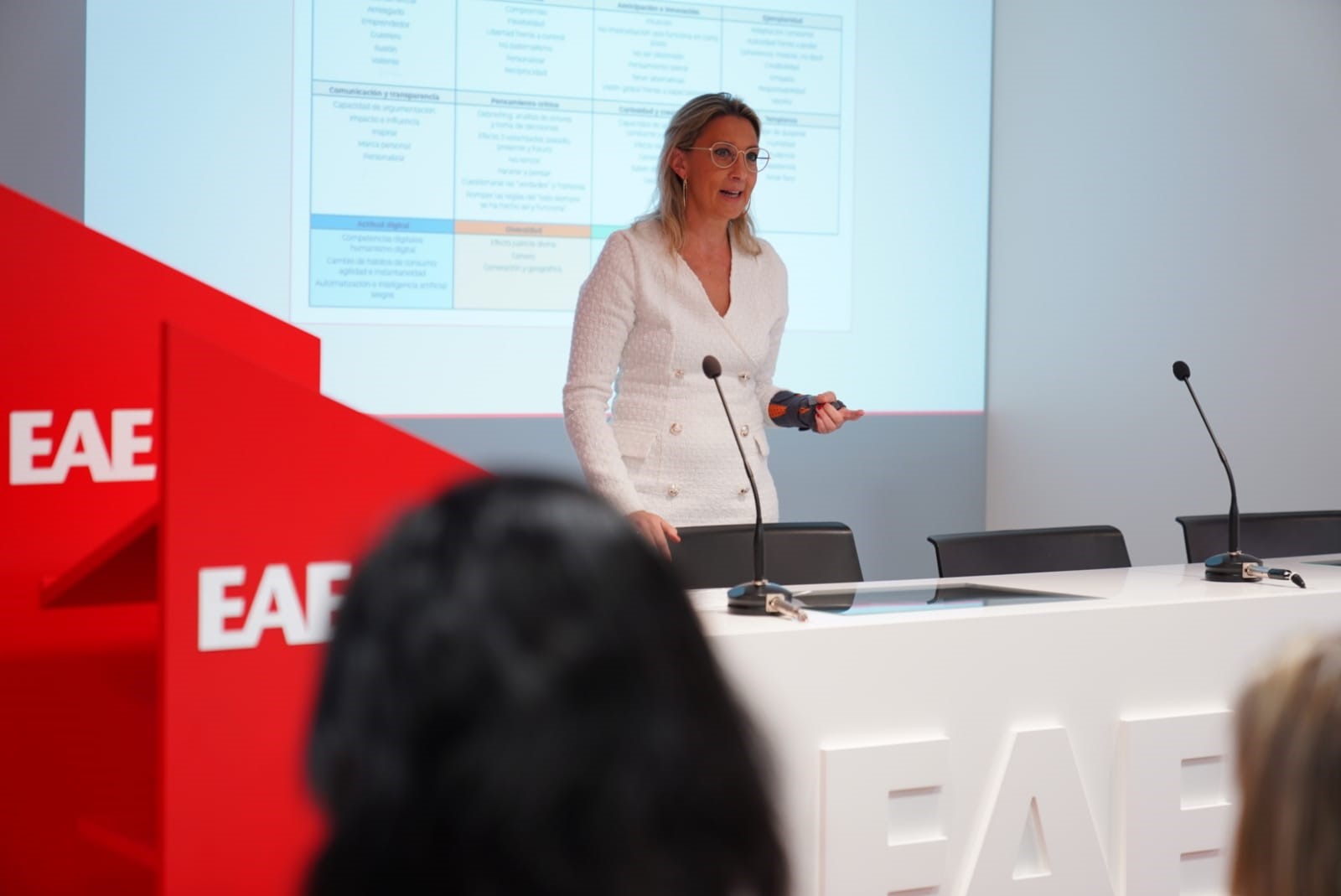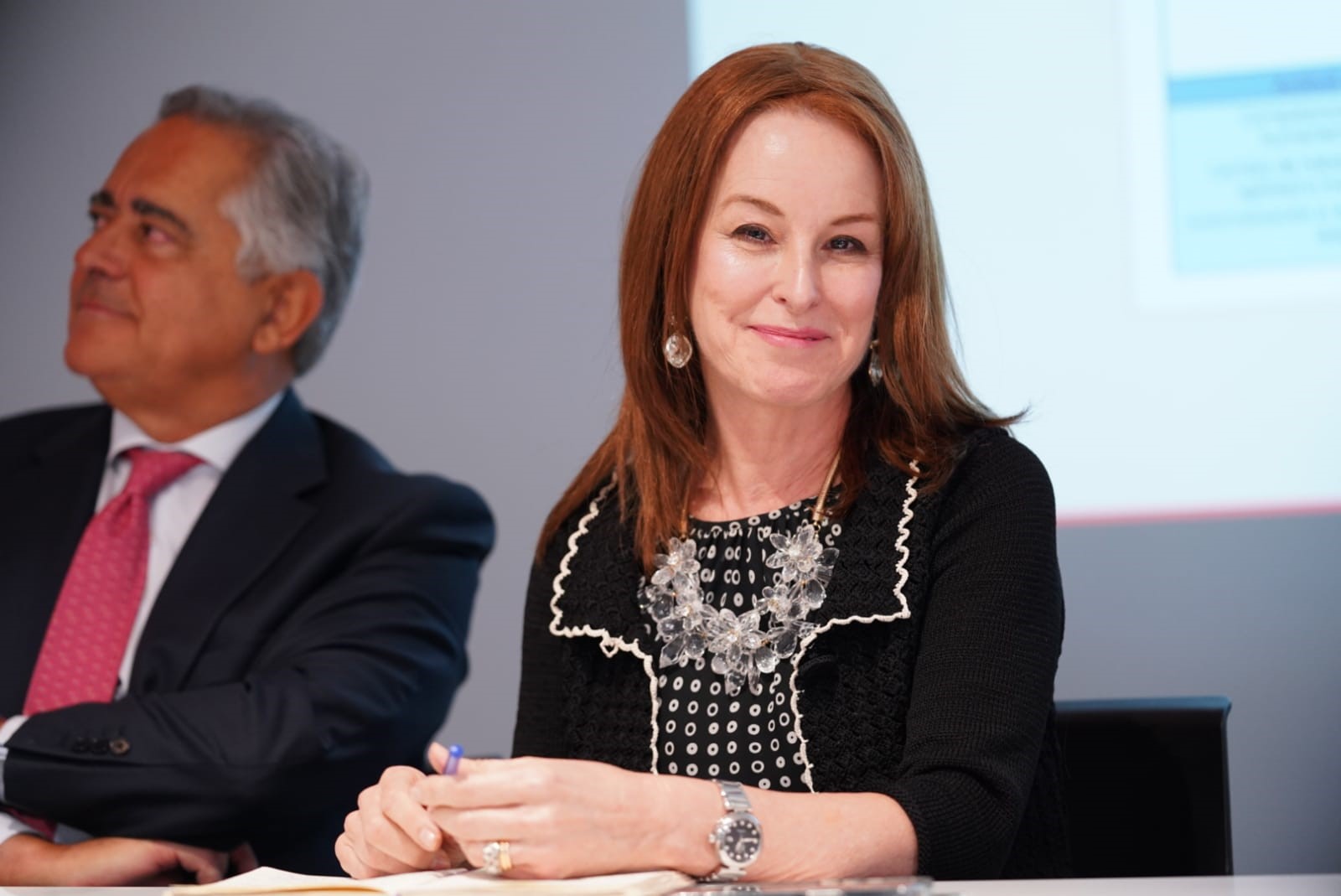
The White Paper on Ethical Leadership in Spain sets out the 8 competencies of an ethical leader
The presentation of the White Paper on Ethical Leadership in Spain, directed by Pilar Llácer, Professor and Director of the Work of the Future Centre at EAE, brought together today, May 17, in the auditorium of EAE Business School Madrid, in a round table with relevant professionals and management references in Spain, such as Juan Manuel Sucunza, President of CEN (Confederación Empresarios de Navarra); Gloria Lomana, Executive President of 50&50 Gender Leadership; Marta Garcia-Valenzuela, Partner of Talengo; Antonio Ramiro Pérez, Director of People and Digital Transformation at Ibermutua; and Luisa Garcia, Partner and CEO of Europe at Llorente y Cuenca, and Luisa Garcia, Partner and CEO of Llorente y Cuenca: Partner at Talengo; Antonio Ramiro Pérez, Director of People and Digital Transformation at Ibermutua; and Luisa Garcia, Partner and CEO Europe at Llorente y Cuenca. The debate, moderated by Federico Buyoló Garcia, Cultural Director at the José Ortega y Gasset - Gregorio Marañón Foundation, was also attended by the author of the study, Pilar Llácer.

For Juan Miguel Sucunza, President of CEN, "companies require leaders who accompany their workers in their work evolution and respect their personal development, achieving a cohesive team based on trust". For the spokesman of the Navarre businessmen, it is essential to lead by example "the values of the entity" and to anticipate changes, which makes companies "more efficient and competitive". Sucunza also stressed "transparency and active listening as the two great challenges of leadership in organizations".
Marta García-Valenzuela, partner at Talengo, focused her speech on the new model of ethical leadership, "which is profoundly innovative and necessary. Especially the cross-cutting competencies of diversity and sustainability, since sustainable leaders have to restore the trust that societies need in their diversity. They must manage the present with short lights but, at the same time, look to the future and be responsible with the footprint they are leaving". She concluded by stressing that "this is the value that sustainability brings to ethical leadership, which is fundamental in these complex times".

In this regard, Antonio Ramiro Pérez, Ibermutua's Director of People and Digital Transformation, stressed "the need to address the various transformations we are undergoing (digital, technological and values), from the inside out". He also gave the keys to understanding the present and future of organizations, which involve "understanding the role of leadership, diversity, critical thinking, transparency, communication, temperance, ethics and exemplarity". "Never has it been more important than now, due to its impact and topicality, the need to imprint values and involve those responsible for organizations with respect to phenomena such as Artificial Intelligence, digitalization or emotional health. All of them, with multiple implications and interrelated perspectives".
For the Executive President of 50&50 Gender Leadership, Gloria Lomana, it is essential that leadership is humanistic and attends more to emotions to collect the feelings of people and takes into account "sustainability and commitment to the environment and, therefore, to the planet, since all of this benefits the people who live together in the world." "The leadership style would reflect the rule of the 5 C's that we establish in 50&50: closeness, certainty, trust, communication, credibility. In this way, leadership becomes more participative, empathetic, flexible, open to innovation and change, with active listening, which results in benefits for the entire organization," adds Lomana.

Eight key competencies and three cross-cutting behavioral axes
The White Paper on Ethical Leadership in Spain, promoted by EAE Business School, identifies the eight key competencies and three transversal behavioral axes to establish an ethical leadership model in today's uncertain environments.
The eight key competencies for ethical leadership according to The White Paper on Ethical Leadership are:
- Ethical ambition. Ambition is that burning desire to achieve a benefit, and it is ethical because it not only refers to individual gain, but also has a positive impact on all stakeholders. The attributes that are associated with this competence are commercial attitude, risk-taker, entrepreneur, warrior, courageous and creator of illusion.
- Confidence. It means thinking that through people's knowledge and skills, it is possible to achieve the expected results. The attributes are commitment, flexibility, freedom versus control, non-paternalism and reciprocity.
- Anticipation and innovation: The changes in consumer habits brought about by digital transformation demand a type of ethical leadership that knows and understands people's behavior, and is able to anticipate what they will demand. The attributes of this competency are being intuitive, not improvising, not being stubborn and lateral thinking.
- Exemplarity. It is the behavior that can incline others to imitation, not because of obligation but because they share the same horizon of ethics and values of all stakeholders. This competence is the necessary and sufficient condition to be able to exercise ethical leadership, and without it it is not possible to apply the rest of the competencies. The attributes derived from this competence are authority versus power, coherence, credibility, empathy, responsibility and values.
- Communication and transparency. Communication has been considered over time as one of the key competencies of leadership; for ethical leadership it is linked to transparency, which is essential for credibility. The attributes linked to this competency are the ability to argue, impact and influence, inspire and personal branding.
- Critical thinking. This is the process of doubting statements or ideas that are usually accepted as true, such as adventitious ideas, which are all those that we tend to believe come from experience. The required attributes are debriefing (analysis of mistakes made in the execution of actions and projects), absence of rancor, 3-speed effect (thinking together in the past, present and future) and breaking the rules of "this has always been done this way and it works".)
- Curiosity and creativity. These are especially relevant because they are not yet 100% replicable by artificial intelligence. Creativity in ethical leadership means developing new solutions out of nothing or from known data but with a different approach. It is related to lateral thinking. The attributes it requires are the ability to learn constantly and with focus, the ability to be sharp, generosity, and the ability to differentiate and stand out.
- Temperance. The current leadership style invites to act with moderation. It becomes a necessary competence to build sustainable partnerships and a culture of impact with all stakeholders of trust and credibility.
These competencies must permeate three basic axes: digital attitude, digital competencies (digital humanism), changing consumer habits; gender, geographic and generational diversity; and sustainability, having a purpose, partnerships to achieve SDG goals and health and wellness.
"Leadership has to constantly evolve and adapt, that's why some of its competencies are intensified with the digital and energy transition processes. And finally, leadership is not only associated with a hierarchy, but it is the force that drives anyone's action and behavior. The purpose, the why we do the work, not just the how, which is the psychological approach to competencies, will be fundamental to grow businesses exponentially and sustainably," says Pilar Llácer, Director of the Work of the Future Centre at EAE Business School and author of the publication.